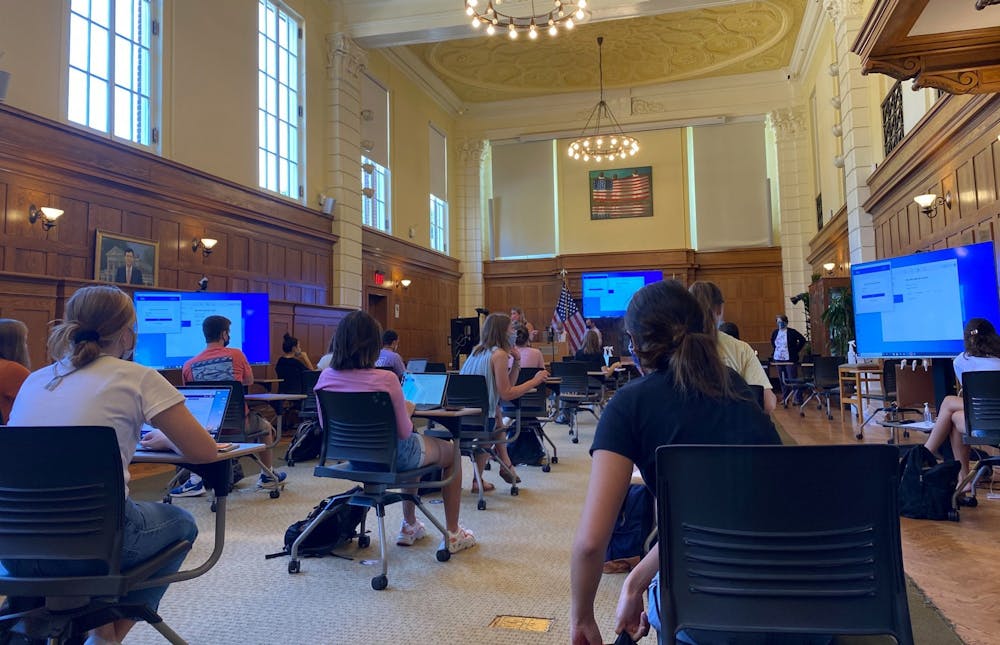Professors across various disciplines have been grappling with the question of how to facilitate the best learning experience for students during an unprecedented pandemic. Faculty, alongside students, have made it through this first month of classes — tasked with upholding the University’s educational standards in a modified capacity.
Understanding students’ high expectations for the caliber of education and instruction, University faculty say they have made efforts to reexamine and optimize class material and activities. Long before students logged onto their first class or sat six feet apart at a socially distanced lecture this semester, instructors had to mold their courses to fit three general class structures — in person, hybrid or online.
Currently, the University is offering an in-person component — completely in-person, or a hybrid or remote option — in approximately 30 percent of its classes overall.
Adapting a class format was the first of many hurdles in this multi-layered process.
Physics Prof. Louca Despina is teaching Statistical Physics this semester — the only upper-level physics course taught in-person with a remote option, a decision made in part by the nature of the class content.
“We’ve considered every learning possibility,” Despina said. “But ultimately it’s very difficult to talk through a screen and not see faces.”
To supplement in-person instruction, Despina, alongside many colleagues, decided to record and upload lectures. She also records her notepad live during class time, on which she writes material not easily expressed through a Powerpoint. Although not all her students can attend the lecture on Grounds, she emphasized that it’s valuable to break the online barrier and learn in person.
Other classes, as currently designed, wouldn’t function in an in-person capacity this semester.
Foreign languages and the Batten School of Public Policy are two examples of departments creating committees of faculty tasked with evaluating all instruction possibilities this semester, considering department-specific constraints. They weighed the feasibility of different learning options and continue to encourage communication to improve adopted practices.
“We came to the conclusion that teaching with masks on will definitely impede the quality of education students are receiving,” said Spanish Prof. David Flórez-Murillo.
The Spanish department undertook a process of redesigning the syllabi for the 1000 and 2000 level classes over the summer. These consist of the three rudimentary language courses all undergraduates must take before graduating from the University. Class material was redesigned with defined standards from the International and Foreign Language Education Department with an emphasis on communication and developing language proficiency.
During the past month, many have been experimenting with different functions on Zoom, tweaking assignments and getting acclimated to instructing online through trial and error.
Professor Tim Davis, assistant professor in the Batten School of Public Policy and Leadership, attested to the unanticipated benefits of online education.
“I have been kind of shocked that we've been able to create some pretty robust learning environments, all online,” Davis said. “I didn't really know until I was forced to do this, but we really can build some meaningful communities.”
Davis teaches a course called Resilient Leadership for Teams and Teammates, where he has experimented with facilitating class work within micro-communities. These smaller groups provide students with a more intimate environment to interact and get to know peers.
Regardless of the discipline, instructors are continuously pivoting their curriculum — weighing what’s working and what isn’t.
Foundations of Commerce Prof. Jeffory Leopold typically teaches around 550 students each semester and has now pivoted to a hybrid model. This entails facilitating weekly asynchronous lectures and 20 weekly discussion sections with discussion leaders.
Discussion sections have had hybrid meetings — some students come to class while others are logged on remotely, and are visible in the classroom via a screen of monitors.
“The complexity is unbelievable,” Leopold said. “Every possible variation has happened... dealing with discussion leaders that are sick and balancing participation between students in class and on the monitors to name a few.”
While more technical nuances accompany hybrid instruction, introducing Zoom and online technology has had some unanticipated benefits, Leopold said.
Prof. Leopold explained that far more students have been participating in discussions this semester — a change he attributes to the nature of the meeting.
“Now, I can also see all the student’s names over Zoom, so whereas I used to just point to them in class impersonally, I can call them by name” he added.
Alongside paid faculty, teaching assistants and discussion leaders also grapple with managing the transition from in-person to online learning.
Akash Bhat is a fourth-year Commerce student and is a teaching assistant for four upper-level classes in the McIntire School of Commerce in Commercial Law I and II, Product Management and Cyber Security.
“I think there are three big things professors (or faculty in general) have to keep in mind in general when it comes to Zoom classes … understanding everyone's circumstances, respecting students time on Zoom, and communicating clearly,” Bhat said.
Bhat points to the importance of empathy and staying connected to students during this challenging time, alongside professors’ frustration of not being able to instruct in-person.
“I've had to deal with a lot of students saying that their circumstances have changed significantly because of COVID and they need accommodations, and even if I personally haven’t experienced that, it’s important for me to sympathize and help however I can,” he added.
TA’s are collaborating with faculty, looking for new ways to replicate that type of energy in the lecture halls, because as Bhat explains, “it gets boring for the students, but it absolutely gets boring for the professor because they can’t interact with the students they want to teach.”
Looking ahead as midterms rapidly approach, instructors have shared ongoing concerns regarding how to administer exams.
Prof. Despina explained that the Physics department has considered administering oral exams this semester and tracking websites students may frequent during exams.
“We’re really stuck between a rock and a hard place,” Despina said.







